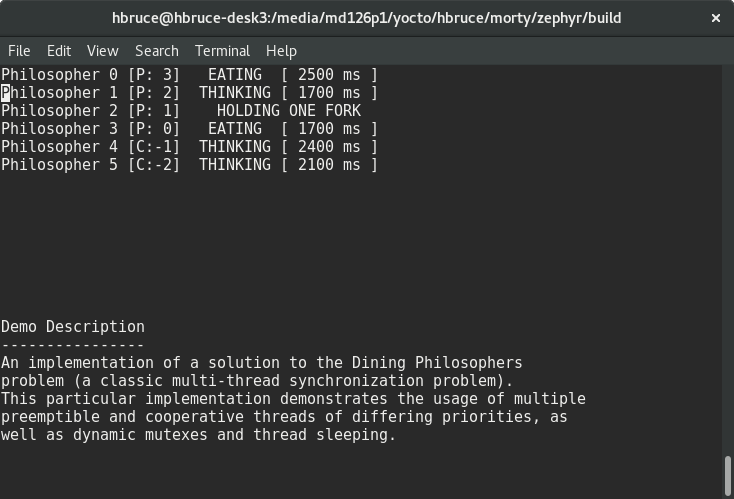TipsAndTricks/BuildingZephyrImages: Difference between revisions
(→Recipe) |
|||
| Line 52: | Line 52: | ||
Here are the steps. We'll use the morty branch for stability. | Here are the steps. We'll use the morty branch for stability. | ||
<pre> | <pre> | ||
$ git clone -b | $ git clone -b dunfell git://git.yoctoproject.org/poky | ||
$ git clone -b | $ git clone -b dunfell git://git.yoctoproject.org/meta-zephyr | ||
$ git clone -b dunfell git://git.openembedded.org/meta-openembedded | |||
$ source poky/oe-init-build-env | $ source poky/oe-init-build-env | ||
$ bitbake-layers add-layer ../meta-zephyr | $ bitbake-layers add-layer ../meta-zephyr | ||
$ bitbake-layers add-layer ../meta-openembedded/meta-oe | |||
$ bitbake-layers add-layer ../meta-openembedded/meta-python | |||
</pre> | </pre> | ||
In local.conf (or set on command line) | In local.conf (or set on command line) | ||
Revision as of 06:20, 22 September 2020
Back to TipsAndTricks
Introduction
Yocto offers an alternative way of building Zephyr Project images by using the meta-zephyr layer.
Configuration
You'll need to install the following additional package python3-pexpect. If you're going to using the Arduino 101 board, you'll also need to configure dfu-util as follows:
Using DFU
Device Firmware Update (DFU) allows you to flash A101 images over USB without the need for a JTAG adaptor. First you'll need to install the package dfu-util on your Linux distro. By default dfu-util needs root privileges to run. You work around this with the following udev rules
- If on Fedora, you need to create the system group plugdev
$ sudo groupadd -r plugdev
- Add user to plugdev group
$ sudo usermod -a -G plugdev $USER
- Create file etc/udev/rules.d/50-arduino101.rules and add the following linr
SUBSYSTEMS=="usb", ATTRS{idVendor}=="8087", ATTRS{idProduct}=="0aba", GROUP="plugdev", MODE="0666"
- Reload udev rules
$ sudo udevadm control --reload-rules
Zephyr Layer
meta-zephyr layer can be found at git://git.yoctoproject.org/meta-zephyr. The layer supports morty and master branches and is dependent on the equivalent poky branch.
Boards and Machines
Zephyr BOARDS typically map to bitbake MACHINES, but underscores become dashes. e.g. BOARD=arduino_101_sss maps to MACHINE = "arduino-101-sss"
Building Zephyr samples
The following instructions build the philosophers sample.
Recipe
The recipe is pretty simple, see below.
- Think of the require statements as the zephyr base class (could/should be inhert zephyr-in-tree-build instead ?
- inhert deploy adds a deploy task (it's a standard poky base class)
- ZEPHYR_SRC_DIR sets location of application
- do_deply puts image in a known location
require zephyr-kernel.inc
require zephyr-kernel-common.inc
inherit deploy
ZEPHYR_SRC_DIR = "${S}/samples/philosophers"
ZEPHYR_BASE = "${S}"
OECMAKE_SOURCEPATH = "${ZEPHYR_SRC_DIR}"
do_deploy () {
install -D ${B}/zephyr/${ZEPHYR_MAKE_OUTPUT} ${DEPLOYDIR}/${PN}.elf
}
addtask deploy after do_compile
do_install[noexec] = "1"
Targeting QEMU
Here are the steps. We'll use the morty branch for stability.
$ git clone -b dunfell git://git.yoctoproject.org/poky $ git clone -b dunfell git://git.yoctoproject.org/meta-zephyr $ git clone -b dunfell git://git.openembedded.org/meta-openembedded $ source poky/oe-init-build-env $ bitbake-layers add-layer ../meta-zephyr $ bitbake-layers add-layer ../meta-openembedded/meta-oe $ bitbake-layers add-layer ../meta-openembedded/meta-python
In local.conf (or set on command line)
DISTRO = "zephyr" MACHINE = "qemu-x86"
Now build a Qemu image of the canonical Zephyr sample
bitbake zephyr-philosophers
Running zephyr qemu image
runqemu qemu-x86
And will produce output like this
Arduino 101
Let's build the philosphers sample for Arduino 101 x86 core. Set up as for QEMU but set machine as follows
MACHINE = "arduino-101"
Then run
bitbake zephyr-philosophers
Note that there will be significant rebuild, as although both qemu-x86 and arduino-101 are 386 class devices, arduino-101 uses the subtly different IAMCU toolchain.
After build complete, use the flash_usb task to flash the target via DFU
bitbake zephyr-philosophers -c flash_usb
Sample text output will appear on serial port.
Arduino 101 and Multiconfig
Inter Processor Mailbox (IPM) is a Zephyr driver that allows communications between processors. The IPM sample shows communication between the x86 and ARC cores and is good way to exercise multi-config.
Configuration
Add the following to local.conf
DISTRO = "zephyr" MACHINE ?= "arduino-101" BBMULTICONFIG ?= "arduino-101 arduino-101-sss"
Create folder multiconfig under conf with a file arduino-101-sss.conf
+ conf
+ multiconfig
arduino-101.conf
arduino-101-sss.conf
The file conf/multiconfig/arduino-101.conf should contain:
MACHINE="arduino-101"
TMPDIR="${TOPDIR}/tmp-arduino-101"
The file conf/multiconfig/arduino-101-sss.conf should contain:
MACHINE="arduino-101-sss"
TMPDIR="${TOPDIR}/tmp-arduino-101-sss"
The TMPDIR settings are a workaround a multiconfig bug exposed by the meta-zephyr.
Building
Build both images:
$ bitbake multiconfig:arduino-101:zephyr-ipm multiconfig:arduino-101-sss:zephyr-ipm
Flashing
Once the build is finished (both images are built), flash:
$ bitbake multiconfig:*:zephyr-ipm -cflash_usb
Running
Press reset, serial output should look like this
===== app started ======== Hello from application processor (x86)! (0) Sensor Subsystem (ARC) is sleeping, mailbox status: 00000000 mask fffff0ef sending messages for IPM device 0xa80064e4 sending messages for IPM device 0xa80064d8 sending messages for IPM device 0xa80064cc Hello from application processor (x86)! (1) Sensor Subsystem (ARC) is sleeping, mailbox status: 00000000 mask fffff0ef pinging sensor subsystem (ARC) for counter status ipm_console0: 'counters: 148 6 7' ipm_console0: 'Hello from ARC!' Hello from application processor (x86)! (2) Sensor Subsystem (ARC) is sleeping, mailbox status: 00000000 mask fffff0ef pinging sensor subsystem (ARC) for counter status ipm_console0: 'counters: 69 50 35'
